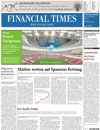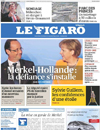More power to Brussels, says Germany’s Chancellor. On June 7 Angela Merkel declared on German television that monetary union should be accompanied by a political union that would “give Europe more opportunities for control.”
In this case, headlines the Financial Times Deutschland, “the federal eagle will lose some feathers.” The business daily indeed warns that —

Transferring competencies is an extremely difficult operation. From the perspective of foreign policy, its price is the division of the EU into a two-speed Europe. Merkel is aware of that, but it no longer bothers her.
Receive the best of European journalism straight to your inbox every Thursday
In legal terms, the only solution is an interstate treaty along the lines of the fiscal pact,” writes the FTD. More precisely, it is the fiscal pact that creates a two-speed union and that could extend to a fiscal or political union. Only bump in the road: such an agreement may be easy to conclude, but the states will need the votes of reluctant countries like the United Kingdom and Slovakia in order to use the EU institutions – the Commission, Parliament and the Court of Justice. Another sizeable obstacle is the German Constitutional Court —

It is the sole judge of where the limit [of transfer of powers] lies. For a real political union, it will have to go through a referendum on a new Basic Law [the German Constitution]. The move towards political union will probably be done sneakily, through cooperation between all the political parties.
In Paris, Le Figaro notes the distrust that is developing between François Hollande and Angela Merkel. In its editorial the conservative daily does not fail to note that —

The German Chancellor, who was said to be ‘isolated’ at the Elysée, has not waited for the (French) legislative elections [on 10 and 17 June) to put her new counterpart in his place. The insistent call from the French president for the pooling of European debt has brought an expected reply: the fiscal federalism that he is calling for will not happen without political federalism. [...] He will have to explain to the French that the eurozone crisis requires substantial transfers of sovereignty.
But, regrets the daily in another commentary, the French president is hiding behind a “deafening silence. Focusing on short-term solutions, he could only be embarrassed by a debate on political union.”

For François Hollande, the situation is particularly uncomfortable. [...] The possibility of a new reform of the fiscal pact, and its ratification, poses a real difficulty. [He] must consider the club of ‘nay-sayers’, including two representatives who have been appointed to the Quai d'Orsay [the Foreign Affairs ministry]. [...] The ball has been tossed by the German Chancellor into the French camp – and sooner or later François Hollande will have to pick it up.
Was this article useful? If so we are delighted!
It is freely available because we believe that the right to free and independent information is essential for democracy. But this right is not guaranteed forever, and independence comes at a cost. We need your support in order to continue publishing independent, multilingual news for all Europeans.
Discover our subscription offers and their exclusive benefits and become a member of our community now!












